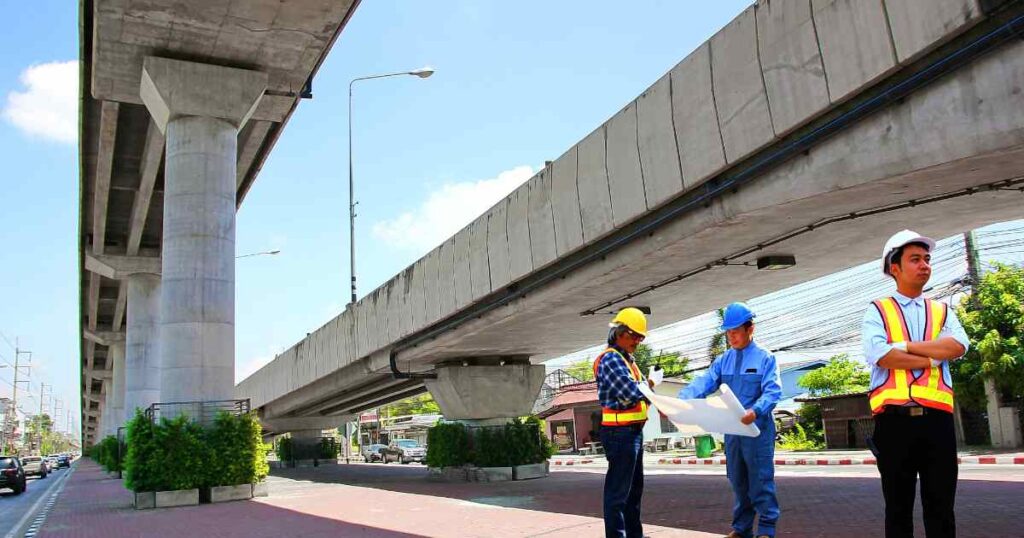Introduction
Are you a civil engineering enthusiast ready to explore the vast array of career paths awaiting you post-graduation? Look no further! In today’s competitive job market, the significance of civil engineering cannot be overstated.
From designing sustainable infrastructures to ensuring the safety and functionality of construction projects, civil engineers play a crucial role in various industries. But what comes next after completing your degree?
In this blog, “The 5 Best Career Options after Civil Engineering,” we dive into the diverse and exciting opportunities that await you in this field. Whether you aspire to specialise in structural engineering, transportation, or environmental consulting, this guide will provide you with insights and inspiration to embark on a fulfilling career journey.
Join us as we lead you through the top career options after civil engineering that will propel your civil engineering career to new heights.

Career after Civil Engineering: A Roadmap to Success
1. Structural Engineer
That’s right! Structural engineering is a major career path after civil engineering. It focuses on the design and construction of safe, sturdy structures.
Structural engineers are like the skeleton system of the construction world. They take the blueprints and translate them into the bones of a building, bridge, or any other infrastructure project. Their primary role involves:
- Designing the framework – This includes creating detailed plans for beams, columns, foundations, and other structural elements.
- Calculating loads and stresses – They meticulously analyse the forces a structure will experience, like weight, wind, and earthquakes, to ensure it can withstand them.
- Selecting materials – They choose the right building materials, such as steel, concrete, or wood, based on strength, weight, and cost considerations.
- Ensuring compliance – They make sure the design adheres to building codes and safety regulations.
The Skills to Stand Tall
To be a successful structural engineer, you’ll need a strong foundation in math, physics, and engineering mechanics. Proficiency in computer-aided design (CAD) software is essential for creating detailed plans and models. Communication and teamwork are also crucial, as you’ll collaborate with architects, contractors, and other engineers to bring a project to life.
Qualifications and Getting Started
Typically, a bachelor’s degree in civil engineering is required, with some employers preferring a master’s in structural engineering. After that, gaining experience through internships or entry-level positions is crucial. Many countries require structural engineers to obtain professional licenses to practice independently.
Growth and Earning Potential
Salary-wise, structural engineers in India can expect a starting salary in the range of ₹4-5 lakhs per annum, with experienced professionals earning upwards of ₹15 lakhs or more depending on their specialisation, experience and the company they work for.

2. Construction Project Manager
Construction project management is another excellent career option that branches from civil engineering. They act as the conductor of the construction orchestra, ensuring everything runs smoothly from start to finish. Construction project managers are the ones who take a project from concept to completion, wearing many hats throughout the process.
Roles and responsibilities of Construction Manager
- Planning and Scheduling – They develop a comprehensive project plan that outlines every stage of construction, timelines, and resource allocation.
- Budget Management -They manage the project budget meticulously, ensuring costs stay on track and identifying areas for potential savings.
- Team Leadership – They lead and motivate a diverse team of construction workers, engineers, architects, and subcontractors.
- Risk Management -They proactively identify and mitigate potential risks that could delay the project or impact costs.
- Quality Control – They ensure the construction adheres to all building codes, safety regulations, and quality standards.
- Communication Hub – They act as the central point of communication, keeping clients, stakeholders, and the project team informed of progress, changes, and any issues.
Growth and Earning Potential
Construction project management offers a promising career path with good earning potential. Starting salaries in India can range from ₹5-7 lakhs per annum, with experienced project managers earning upwards of ₹20 lakhs or more depending on the project size, complexity, and the company they work for. As you gain experience, you can progress to managing larger projects or specialise in specific areas like residential, commercial, or infrastructure construction.
3. Urban Planner

Civil engineering offers a strong foundation for a career in urban planning. While they are distinct fields, the knowledge and skills you gain in civil engineering can be incredibly valuable in shaping livable cities.
Urban planning is all about shaping the future of our cities and towns. Civil engineers, with their expertise in infrastructure design and construction, play a crucial role in this process. Here’s why civil engineering graduates are well-positioned for urban planning careers:
- Infrastructure Expertise: Civil engineers understand the intricacies of designing and building roads, bridges, water systems, and other essential infrastructure that form the backbone of any city.
- Sustainability Focus: Modern civil engineering emphasises sustainable practices, which aligns perfectly with the growing focus on creating eco-friendly and resilient urban areas.
- Problem-Solving Skills: Civil engineers are adept at solving complex engineering challenges, a skillset highly transferable to tackling the intricate issues of urban development.
Urban planning offers a multitude of specialisation options to tailor your career to your interests:
Transportation Planning: Focus on designing efficient and sustainable transportation networks.
Environmental Planning: Specialize in creating eco-friendly and resilient urban environments.
Economic Development Planning: Contribute to the economic growth and prosperity of a city.
A Rewarding Path
The career path for urban planners offers opportunities for advancement and leadership roles. You could become a project manager for large-scale urban development projects, a policy advisor for government agencies, or even open your own urban planning consultancy.
While a dedicated degree in urban planning is often preferred by employers, your civil engineering background combined with relevant coursework or a master’s degree in urban planning can make you a strong candidate.
4. Geotechnical Engineer
Geotechnical engineers play a critical role in the civil engineering world, acting as the earth’s detectives. They are the ones who analyze the hidden world beneath our feet – soil, rock, and groundwater – to ensure the stability and safety of construction projects.
Here’s a breakdown of their key responsibilities:
- Site Investigation – They conduct thorough investigations to assess the properties of soil and rock at a construction site. This may involve collecting samples through drilling, performing tests in laboratories, and analysing geological data.
- Foundation Design – Based on their analysis, they recommend the most suitable foundation type for the project, considering factors like bearing capacity, settlement potential, and soil stability.
- Risk Assessment and Mitigation – They identify potential geological hazards like landslides, earthquakes, or flooding, and recommend measures to mitigate these risks.
- Construction Monitoring – They may monitor the behaviour of soil and rock during construction to ensure the stability of foundations and slopes.
- Material Selection – They advise on the selection of appropriate construction materials like concrete or steel based on the underlying soil conditions.
The Importance of Geotechnical Engineering
Geotechnical engineering is crucial for ensuring the safety and longevity of structures by understanding the ground conditions. This can prevent catastrophic consequences like building collapse or infrastructure damage. Choosing the right foundation type based on soil properties can lead to cost-effective construction. Their recommendations can help minimise the environmental impact of construction projects.
A Strong Foundation for Your Future
If you’re fascinated by the world beneath our feet, enjoy problem-solving, and are passionate about creating safe and sustainable structures, then geotechnical engineering could be the perfect career path for you. It offers a unique blend of science, engineering, and problem-solving, with the potential to make a real difference in the world.

5. Transportation Engineer
Transportation engineers are the masterminds behind the efficient movement of people and goods within our cities and across vast distances. If you have a passion for making transportation systems safer, smoother, and more efficient, then this dynamic field might be your perfect career fit!
Transportation engineers play a crucial role in designing, planning, and managing our transportation infrastructure. Here’s a glimpse into their core duties:
- Traffic Analysis – They analyse traffic patterns, identify bottlenecks and congestion points, and develop strategies to improve traffic flow. This may involve collecting data, using traffic simulation software, and proposing solutions like signal timing adjustments or road network improvements.
- Road Design – They design new roads, highways, and intersections, ensuring they meet safety standards, accommodate projected traffic volumes, and integrate seamlessly with the surrounding environment.
- Public Transportation Planning – They plan and design public transportation systems like bus rapid transit networks, subways, or light rail systems, making it easier for people to get around without relying on cars.
- Safety Engineering – They design features to improve road safety, such as sidewalks, bike lanes, crosswalks, and traffic calming measures.
- Intelligent Transportation Systems (ITS) -They may be involved in implementing intelligent transportation systems that use technology to improve traffic flow, manage congestion, and enhance safety.
Shaping the Future of Transportation
The field of transportation engineering is constantly evolving, with a growing focus on sustainability and new technologies:
- Sustainable Transportation: Transportation engineers are playing a key role in promoting sustainable transportation options like cycling, walking, and electric vehicles.
- Emerging Technologies: They are exploring the integration of new technologies like autonomous vehicles, connected car systems, and advanced traffic management tools into our transportation networks.

A Career on the Move
If you’re intrigued by the challenges of traffic flow, enjoy innovative problem-solving, and are passionate about creating efficient and sustainable transportation systems, then transportation engineering could be the perfect career path for you. It offers the opportunity to make a real difference in the way people and goods move around our world!
Conclusion
The career options after civil engineering are diverse and promising. Whether you choose to work in traditional fields such as construction, design, or consulting or explore newer options like sustainable development or project management, a career in civil engineering offers stability and growth.
It is important to assess your interests and strengths before making a decision, but with the right skills and determination, the possibilities are endless. So, don’t be afraid to take the leap and pursue a fulfilling career in civil engineering!
FAQs
1. What factors should I consider when choosing a career path after completing my civil engineering degree?
Choose a career path after civil engineering by considering interests, strengths, long-term goals, research fields, job market demand, salary potential, growth opportunities, and work-life balance.
2. Do I need to pursue additional certifications or specialisations to excel in my chosen career path?
Additional certifications or specialisations can improve career advancement opportunities, such as obtaining a Professional Engineer license in structural engineering or project management or sustainable design certifications.
3. Is it possible to switch career paths within civil engineering after gaining experience in one area?
Civil engineering career paths can be successfully transitioned with the right experience, skills, and education, with networking, mentorship, and skill acquisition facilitating successful transitions.
4. How can I best prepare for a successful career after completing my civil engineering degree?
To succeed in a civil engineering career, gain practical experience through internships, co-op programs, and entry-level positions, build a professional network, continuously develop technical skills, stay updated on industry trends, and consider further education or certifications.







